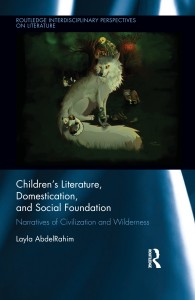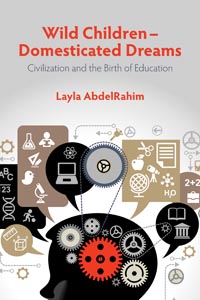I am an independent scholar and author with no institutional funding. Please, consider supporting me on Patreon so I can continue to do the work. Thank you!
SWAA Book Review by Hilary Kelly Children’s Literature
SWAA NEWSLETTER
Southwestern Anthropological Association
Fall 2018, Volume 59 No. 3, page 17
BOOK CORNER
Children’s Literature, Domestication, and Social Foundation: Narratives of Civilization and Wilderness
By Layla AbdelRahim
2015 Taylor &Francis Routledge Interdisciplinary Perspectives on Literature Series, #31
274 pages
ISBN-10: 0415661102
REVIEW by Hilarie Kelly (University of La Verne)
There are several recent and very good published resources on the anthropology of childhood, most particularly the work of David F. Lancy.1 Psychological anthropology, with major scholars like Harvard’s John and Beatrice Whiting, and Tom Weisner here locally at UCLA, played a major role in fostering research and publication on this topic for the past fifty years. Ethnographic studies like these depend on observation of visible examples of child socialization and enculturation practices. Literate societies such as our own, where children’s literature is ever increasing in popularity, produce a rich field of material for anthropologists to examine and consider.
How is this literature aimed, if not at both children and at the adults who raise and teach them? Who is the intended audience for these stories, for The Lord of the Rings or Harry Potter books or for their filmic counterparts? Looking at classics like Hans Christian Anderson and the Grimm brothers, as well as recent authors like Michelle Markel, who is local and the spouse of Cal State Northridge anthropologist Martin Cohen, it is quite apparent that children’s literature is aimed at more than the imaginations and psyches of children. (See, for example, Markel’s Brave Girl: Clara and the Shirtwaist Makers’ Strike of 1909, or her recent Balderdash!: John Newberry and the Boisterous Birth of Children’s Books.)
This literature is produced by and for adults as well. Layla AbdelRahim’s book, Children’s Literature, Domestication, and Social Foundation: Narratives of Civilization and Wilderness, explores in great detail the stories we tell ourselves, the paradigms of knowing that we acquire early in life and shed only with great difficulty, if at all. She is especially interested in how stories, which we begin to learn early in life and imbibe to our dying day, communicate important notions about the relationship between nature and culture (framed in part as civilization and wilderness), and chaos and order. The author’s approach is not simple structuralism, however; it goes well beyond the usual binaries. Happily, it is intellectually and socially critical and theoretically sophisticated, and very rich with cross-cultural material. I was especially happy to read the author’s ethnographic examples, which rang quite true, from her interactions with Somalis in the diaspora, a population with which I am also familiar.
The author, as anthropologist, was able to capture some of the important contrasts between oral traditions and literate traditions, majority and minority communities, and varied experiences with globalism. The book is both a meaty and a charming read, and suitable for advanced upper division and graduate students, as well as professionals.
Look for Layla AbdelRahim’s book at the Publishers’ Exhibit Hall at the American Anthropological Association meetings in San Jose, Nov. 14-18, 2018.
__________________________
1. Lancy, David F.
2017 Raising Children: Surprising Insights from Other Cultures. Cambridge University Press.
ISBN-10: 1108400302; ISBN-13: 978-1108400305
2015 The Anthropology of Childhood: Cherubs, Chattel, Changelings. 2nd Ed.. Cambridge University Press.
ISBN-10: 1107420989
BOOK CORNER, page 17, Fall 2018, Volume 59 No. 3
Filed in: Uncategorized.









